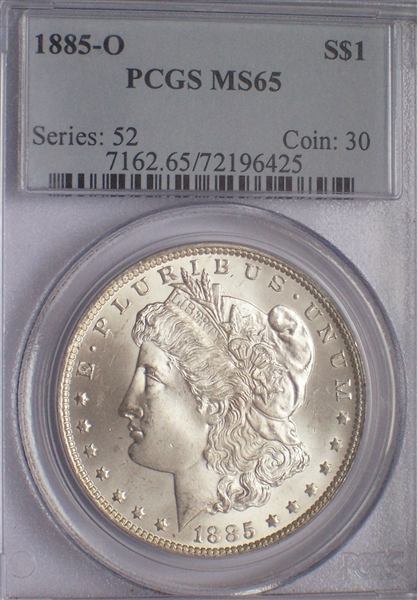1885-O $1 MS65 认证号72196425, PCGS号7162
专家评论
Q. David Bowers
The following narrative, with minor editing, is from my "Silver Dollars & Trade Dollars of the United States: A Complete Encyclopedia" (Wolfeboro, NH: Bowers and Merena Galleries, Inc., 1993)Coinage Context
Nothing but dollars: The New Orleans Mint produced silver dollars exclusively during the 1885 year.
Numismatic Information
Hoard coins: Following the closing of the New Orleans Mint, quantities of 1885O dollars were shipped to the Treasury Building in Washington, D.C. and the Philadelphia Mint for long-term storage. From the Washington vault, 1885-O dollars were paid out beginning by the early 1930s, and in multiple-bag quantities in 1938, 1953, 1954, and 1957. In October 1962, continuing into early 1963, vast quantities, probably amounting to millions of coins, were released from storage at the Philadelphia Mint.
The 1883-O, 1884-O, and 1885-O constitute the bulk of approximately 10 million coins released from a long-sealed vault in the Philadelphia Mint, beginning in October 1962 and continuing through much of 1963. My estimate is that the breakdown of these three dates is about as follows: 1883-O: 1.5 to 2.5 million coins; 1884-O: 2.5 to four million coins; and 1885-O: two to 3.5 million coins. These are, of course, in addition to bags released before 1962. While many went into the hands of investors, hoarders, and collectors, others-possibly amounting to millions of pieces totally-went into circulation.
Many of these were melted in the 1970s during the run-up in silver bullion prices.
Many Uncirculated 1885-O dollars were in the Continental-Illinois Bank hoard.
Circulated grades: The 1885-O dollar is very common in Worn grades and attracts scant numismatic notice, due to the easy availability of Mint State coins.
Mint State grades: The 1885-O is the most common of all New Orleans Mint silver dollars in Uncirculated grade and among certified coins from this mint is the most common issue at levels from MS-63 through MS-65. It is believed that 2.5 to 3.5 million exist at the MS-60 to 62 level, a staggering quantity. In MS-63 grade, the estimated population is 800,000 to 1,300,000, followed by 400,000 to 600,000 in MS-64, and 100,000 to 175,000 MS-65 or better coins.
The strike of 1885-O dollars is average. Examples are seen weakly defined at the centers, while others are sharply struck. Certain flatly-struck coins have what Wayne Miller called a "belly button" or a recessed or dimpled area in the lowest portion of the eagle's breast, due to metal not filling the deepest portion of the die. Cherrypicking is easy to do for this issue and is advised.
Prooflike coins: Semi-prooflike 1885-O dollars are very common, although the contrast is usually low between the fields and the devices. As such, they are not necessarily objects of beauty. This is especially the case when they are in low grades and have many bagmarks. Full, PL pieces are common, and probably 15,000 or more remain. Often, prooflike coins are somewhat flatly struck. DMPL are about as populous as PLs. About 10% to 15% are MS-65 or better.
Varieties
Circulation strikes:
1. Normal date: Breen-5583. Gems and bagmarked prooflikes are common, even DMPLs (mostly less than gem quality). The figure 10 pairs of dies is almost certainly a typographical error for 40 pairs. At least four VAM varieties have partly repunched dates. VAM-1A is from a rusted reverse die (New Orleans humidity caused dies to rust quickly, unless they were protected with grease).
Dies prepared: Obverse: 10 (or 40?); Reverse: 10 (or 40?)
Circulation strike mintage: 9,185,000; Delivery figures by month: January: 800,000; February: 800,000; March: 950,000; April: 910,000; May: 900,000; June: 925,000; July: 100,000; August: 600,000; September: 800,000; October: 800,000; November: 800,000; December: 800,000.
Estimated quantity melted: Millions under the Pittman Act and later during the rise in silver bullion prices in the late 1970s.
Availability of prooflike coins: Semi-prooflike coins are common, PL and DMPL coins are less common, but still plentiful.
Characteristics of striking: Varies from fiat to sharp, but most ate weakly defined at the centers.
Known hoards of Mint State coins: Bags of 1,000 coins were released by the Treasury in 1938 and in December 1954; large quantities (millions) were released 1962-1964.
Commentary
In Mint State this is one of the most common Morgan dollars.
PCGS #
7162
设计师
George T. Morgan
边缘
Reeded
直径
38.10 毫米
重量
26.73 克
铸币数量
9185000
金属成分
90% Silver, 10% Copper
更高评级数量
4835
评级较低的钱币数量
193525
地区
The United States of America
价格指南
PCGS 数量报告
拍卖 - PCGS 评级的
拍卖 - NGC 评级的
稀有性和存量估计 了解更多
| 所有评级 | 925000 |
| 60或以上 | 500000 |
| 65或以上 | 72000 |
| 所有评级 | R-1.1 |
| 60或以上 | R-1.6 |
| 65或以上 | R-2.2 |
| 所有评级 | 87 / 117 TIE |
| 60或以上 | 104 / 117 TIE |
| 65或以上 | 110 / 117 TIE |
| 所有评级 | 87 / 117 TIE |
| 60或以上 | 104 / 117 TIE |
| 65或以上 | 110 / 117 TIE |
























